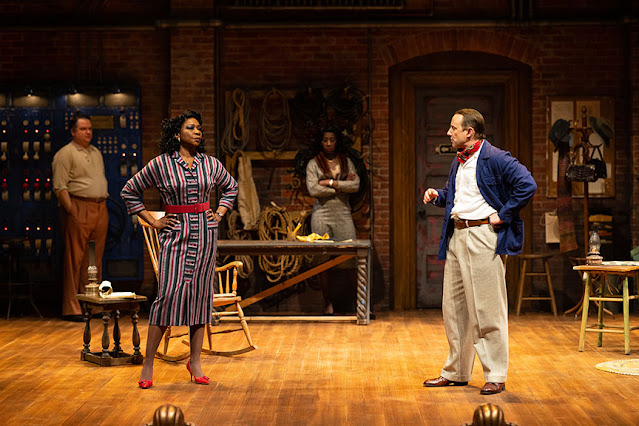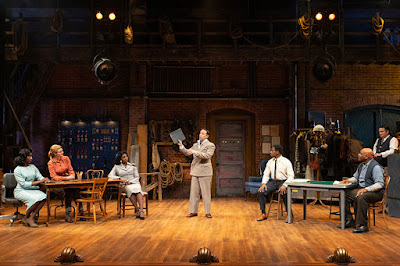Written in the 1950s, the Piece Shows How Few Things Have Changed
A Blog View by Alejandra Enciso-Dardashti
 |
| (from left) Jake Millgard as Eddie Fenton, Ramona Keller as Wiletta Mayer, Bibi Mama as Millie Davis, and Kevin Isola as Al Manners in Trouble in Mind, 2022. Photo by Rich Soublet II. |
Trouble in Mind debuted in 1955 Off-Broadway and received an Obie Award the following year for best original Off-Broadway production, making Alice Childress the first African-American woman to win an Obie. The piece had a rocky start, being originally a three-act play with a different director that stepped down due to problems with the cast -the irony- and Childress directed. While the assumed step would be to go to Broadway next, the play did not make it because producers wanted too many changes, and Alice -rightfully so-refused. She died in 1994 and never got to see this work (at least on the earthly plane) on the Great White Way.
It was until 2021 that the piece was finally produced on Broadway starring LaChanze as Wiletta Mayer. In 2015, MOXIE Theatre had a wonderful production of Trouble in Mind with a solid cast directed by Delicia Turner-Sonneberg. Now, seven years later and months after closing in New York, Trouble comes back to life as part of The Old Globe's season and also directed by Delicia. As with all The Globe productions, especially the ones presented in the Donald and Darlene Shiley Stage, the set and wardrobe design are beautiful and crafted to detail. Lawrence E. Moten III's view of a Broadway Theatre in New York with the stage door, lightboxes, and other backstage props, gives it a historical, old theatre feels in browns and golds that just print onto the story. Nicole Jescinth Smith's wardrobe 1950s design, around the cold East Coast winter with pencil skirts, small hats, and two colored shoes makes such beautiful composition, audiences immerse right on in.
 |
| The cast of Trouble in Mind, 2022. Photo by Rich Soublet II. |
In this story of a play within a play, a cast of actors starts arriving at the theatre to rehearse Chaos in Belleville, a story that takes place in the south. Wiletta Mayer (Ramona Keller) is a seasoned actress that knows the ways, the formulas, and the politics of the industry. She tries to explain it to starting out actor John Nevins (Michael Zachary Tunstill) and encourages him to go along with the director of the play, who is white, and whenever he makes jokes to laugh. She even advises him to lie about being part of the cast of a revival of Porgy and Bess as a kid. He follows the advice and the formulas surprisingly work, as both Al Manners the director (Kevin Isola), and another seasoned actor Sheldon Forrester (Victor Morris), "recognize" Nevins from his childhood gig. The other two actresses are Millie Davis (Bibi Mama) a younger Black woman who has her tiffs with Wiletta and flaunts amazing outfits and accessories, and Judy Sears (Maggie Walters) also starting out as an actress in the big city, and very happy for her role as the southern belle, thinking that it will educate audiences. Wiletta playing the game knows what to do with her scenes and is ready to deliver. The director indicates that he wants them to start in the middle of act one. Because she is on "automatic" the director asks what she feels when singing a song in the script and then the chain of events related to the play and the way it has been written depicting stereotypes, racism, and situations that simply would not happen in real life, take place. One of the lines in Sheldon's role says "But if'n you don't mind we would like to use the barn", first questioning if the line has a typo and what does that even mean, Sheldon continues on. Millie points out a headscarf and the inconsistencies go on. Ramona as Wiletta is strong with an amazing voice and portrayal. Bibi Mama puts an added sass to already outspoken Millie.
 |
| Ramona Keller as Wiletta Mayer in Trouble in Mind, 2022. Photo by Rich Soublet II. |
Delicia did it again directing another great one. I also appreciated how the movement and actors went beyond the stage and onto the seats using part of the theatre as their theatre space showing audiences a true behind-the-scenes of a rehearsal.
Hopefully, producing these plays and including them in seasons of theatres like The Old Globe, will shine a brighter light on how really representation, diversity, and equity are not how they should be, especially on the bigger stages. It also questions who should be at the table and who should transfer their seat?
Wiletta questioned the script and she did not give in just like Alice Childress did not give in to the requested rewrites. She did not get to see Trouble in Mind on Broadway in this lifetime yet, the work has so much strength, that 66 years later she is still holding class.
Trouble in Mind is currently playing until March 13. For ticket prices and performance times please click here.
Check out the lovely conversation we had with Bibi Mama here.

No comments:
Post a Comment